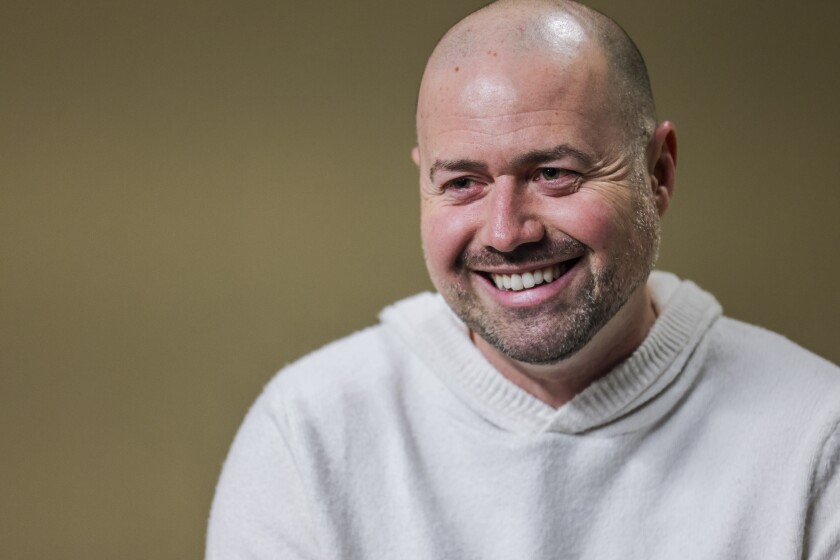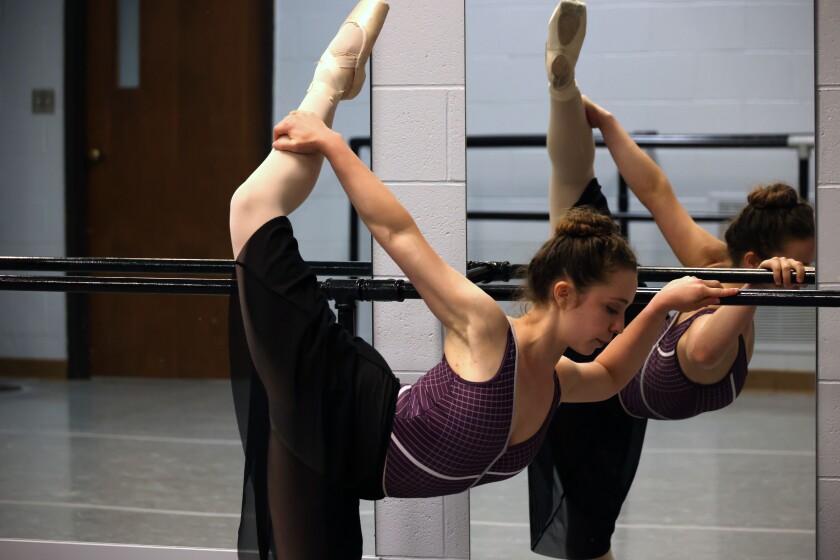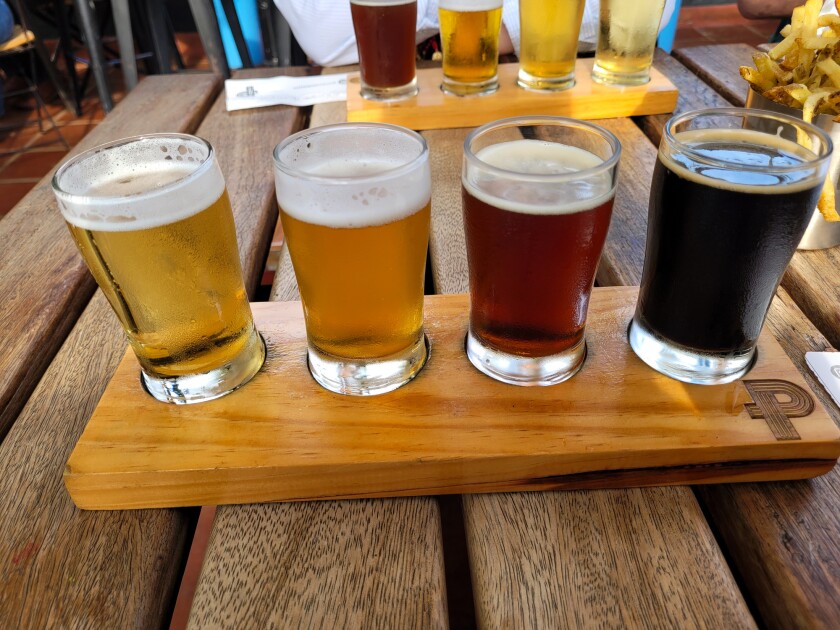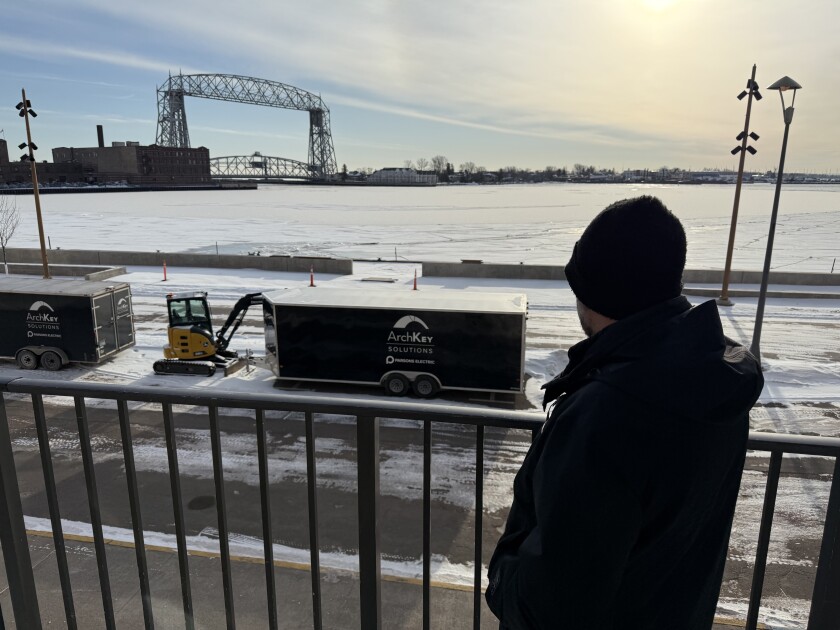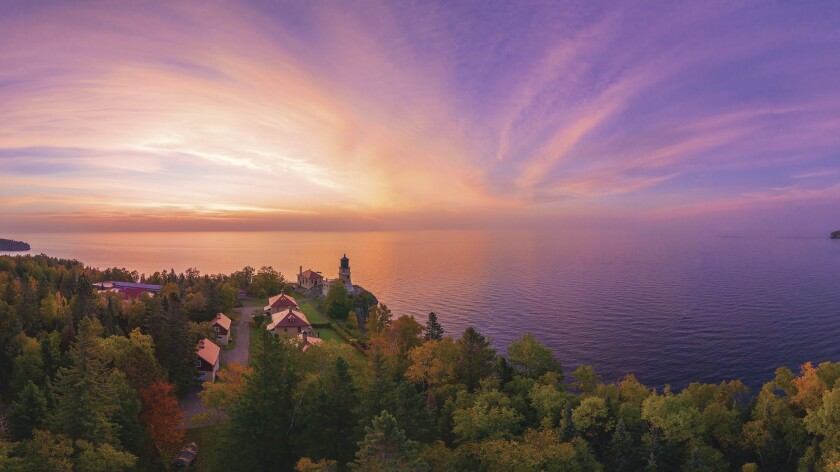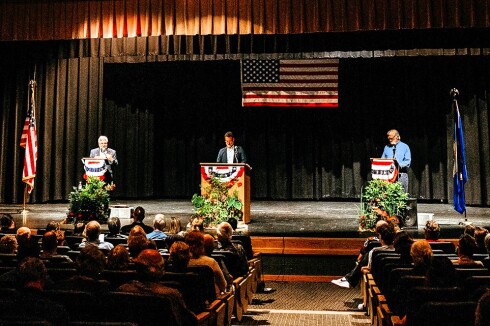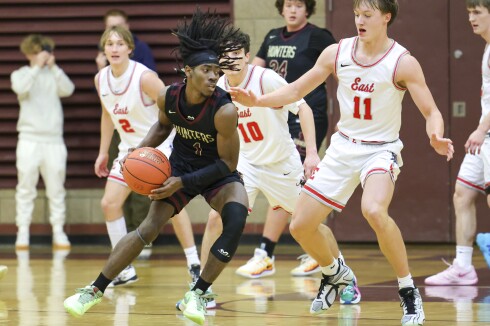DULUTH — Let's say you're a resident of Duluth and you write a historical novel set in New York. Are you eligible for a Northeastern Minnesota Book Award?
"Forget it," said Molly Hoeg, laughing. "You don't qualify!"
ADVERTISEMENT
Hoeg and Gail Trowbridge were sitting on a bench in Canal Park last week, looking out at Lake Superior as they described how their organization, Lake Superior Writers, has stepped in to run the regional awards. Hoeg is Lake Superior Writers board chair; Trowbridge is a former board chair and a member of the awards' steering committee.
"There's a very defined area of the counties of Minnesota that are covered" by the awards, said Hoeg. That would be Aitkin, Carlton, Cook, Itasca, Kanabec, Koochiching, Lake, Pine and St. Louis counties. "The book must be either representative of that area, or it might take place in that area or characters might come from that area."
That distinguishes the Northeastern Minnesota Book Awards — NEMBA, as they're known — from the Minnesota Book Awards, which set eligibility not by subject matter but by authors' residence. "There's a very definite Northeastern Minnesota focus in the material in the book," said Hoeg.
The latest round of NEMBA winners were announced Tuesday, Oct. 11, by Lake Superior Writers, which is running the awards for the first time this year. It's been two years since awards were handed out, so this year's honorees include titles published in both 2020 and 2021.
Since the awards' founding in 1988, they were administered by the staff of the Kathryn A. Martin Library at the University of Minnesota Duluth. "The ceremony for them and how the awards are administered had kind of evolved over the years," said Matthew Rosendahl, who's been director of that library for the past nine years.
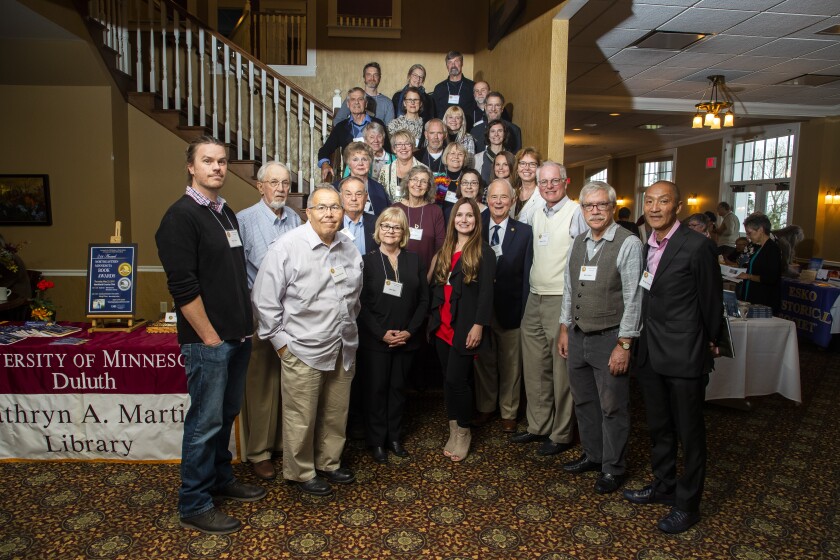
"They were held at the DECC with a full meal," Rosendahl remembered. "They were also held here in our library. There's been the reception at Kirby Ballroom. We've held it out in some community sites before."
A reception was planned for the 2020 awards, then canceled due to COVID-19. Winners were announced virtually, and then UMD decided to let the awards go.
ADVERTISEMENT
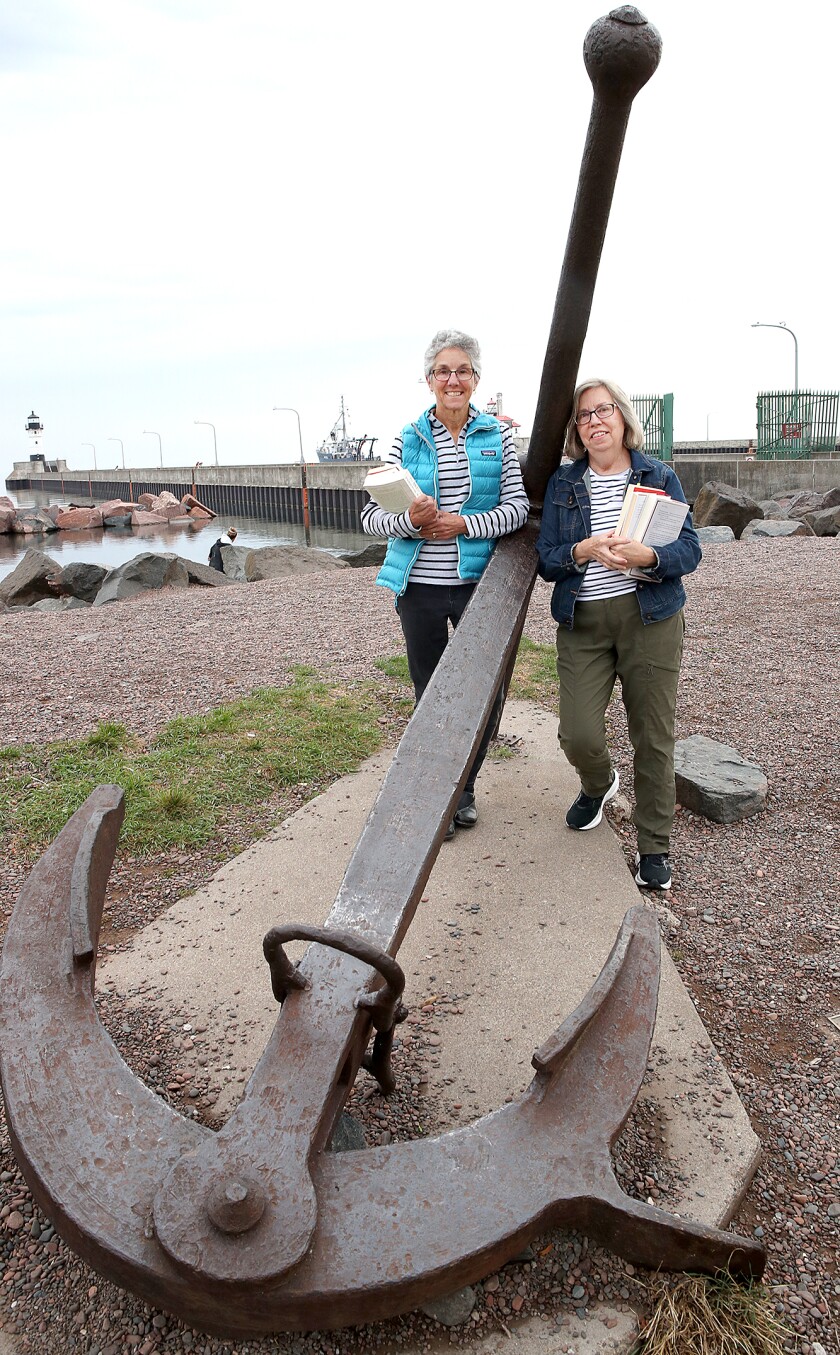
"Like so many other businesses and organizations, the pandemic has also affected NEMBA’s primary organizer and host," the library announced in a 2021 news release. "The university offered a retirement incentive in 2020 and also implemented a hiring freeze, resulting in a 40% decrease in library staffing."
"We didn't have a dedicated staff to just focus on the awards," said Gail Trygstad, a library staffer from 1999 until her 2021 retirement. "The NEMBA team was made up of people from all the different departments in the library." Lake Superior Writers had been an "instrumental" partner for NEMBA, said Trygstad, along with Friends of the Duluth Public Library.
"Our library is part of a public land grant university. We not only serve the students, faculty and staff at UMD, but our library is open to the public," said Rosendahl.
"Sustaining the local book award seemed like a good thing to continue doing. It was always a challenge given our level of staffing ... Lake Superior Writers was the organization that came forward, who were ready to take on the award and continue running it."
The offer wasn't made lightly, said Hoeg. "We thought long and hard about, 'If we were to do this, what would it look like?' Because we can't jump in and do the large public announcement party that they did." At least, not right away. "We're trying really hard to do a quality job, and we're not going to take on something in a hurry."
It was enough of a process to evaluate 38 nominated titles, with an all-volunteer group of readers and organizers. The Arrowhead Regional Arts Council contributed bookshelf and conference room space to organize titles, and longtime NEMBA reading team leader Pauline Nuhring returned to run the process. "We easily reached the number of readers needed for the teams," said Hoeg, "which is very gratifying for our first time around."
It's yet another milestone for Lake Superior Writers, which has proven a flexible and resilient group since its 1998 founding as a nonprofit. "We had our symphony, we had our matinee musicale. We had our ballet, we had our music venues and we had our art institute and our historical institute," founding member Mara Hart told the News Tribune in 2019. "But there was nothing really for writers that was a way of bonding writers and encouraging writing in Duluth."
ADVERTISEMENT
The nonprofit grew out of a writing group at the Depot. Over the years Lake Superior Writers has regularly hosted such groups, as well as classes, contests and events including 2006's Great Northern Festival of Words.
"That was really a huge undertaking for the organization back then," said Trowbridge, who's been involved with the group since the 1990s. The organization has occupied various spaces over the years, but it doesn't currently have a physical office.
The organization's membership of 200-plus has held steady over the past few years, as the group found virtual meetings were good for more than just dodging coronavirus.
"We've always had the issue that the region we serve is so large," said Trowbridge. "All the way up to the Canadian border, and (over to) northern Wisconsin. It would be really onerous, and some people would do it, to drive in from Grand Rapids to go to a class in the evening."
"We have now started to draw people from not only across the region," said Hoeg. "We'll get the occasional one that might be on the East Coast."
"We get people (from the) Twin Cities," said Trowbridge. "Pennsylvania. But a lot of people from rural northern Minnesota and Northeastern Minnesota, and then northern Wisconsin. They feel really happy that there's a connection, because writers ... that's kind of a lonely occupation. It's so great to be able to talk about writing with other writers."
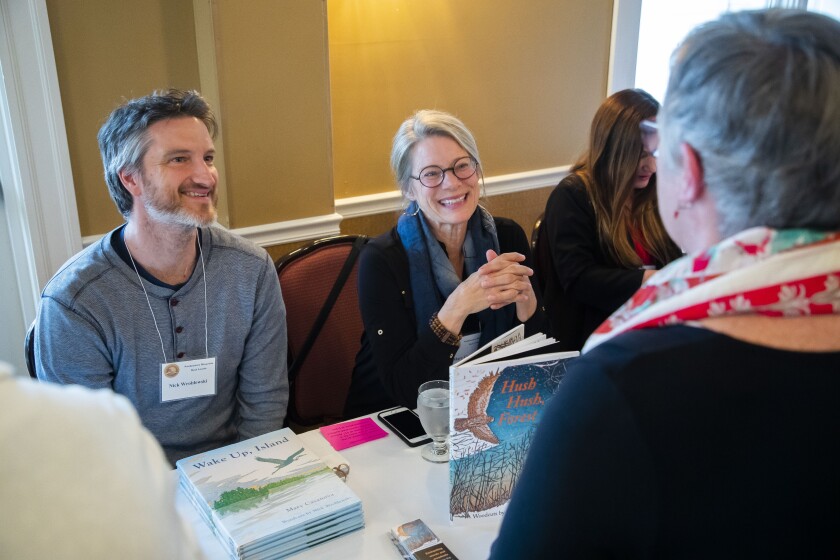
"They do so much to support new, upcoming writers, to sustain writers," said Rosendahl. "They're bringing a lot of enthusiasm and community outreach to make sure that they don't just sustain the awards, but that they continue to grow and evolve."
ADVERTISEMENT
Until the 2000s, NEMBA honored only a single book per year — starting with News Tribune writer Sam Cook's "Quiet Magic" in 1988. The awards have since expanded, and this year books were honored in five categories.
Chris Stark won this year's fiction award for "Carnival Lights." Jayson Iwen's "Roze and Blud" took the poetry prize, while Tony Dierckins won the nonfiction award for his "Duluth: An Urban Biography." The memoir prize, awarded separately from general nonfiction, went to Lee Radzak (with Curt Brown) for "The View from Split Rock: A Lighthouse Keeper's Life." Finally, "The Fire," by Thomas D. Peacock with illustrations by Anna Granholm, took the children's literature award this year. For a complete list of winners, honorable mentions and nominees, see lakesuperiorwriters.org.
Winning a NEMBA can be particularly important for lesser-known writers. "It's common, at Northeastern Minnesota Book Awards, for a debut author, someone who's written their first book, to receive recognition," said Rosendahl. "I've heard from folks who said they never in their life dreamed they'd write a book, and then here they are on stage getting recognized or even winning an award."
"I think of Peter Geye," said Trygstad. "When he first won, he was just so excited. He was like, 'I can't believe it! I can't believe I won this!'" He's since gone on to become one of the state's best known novelists. "We've had some good speakers over the years," Trygstad added. "Kevin Kling was hilarious. ... We had Cathy Wurzer and Lorna Landvik, Brian Freeman, William Kent Krueger."
Hoeg said Lake Superior Writers "absolutely" hope to return to the tradition of hosting NEMBA award ceremonies. "In the future, we might look at fundraising or partners, where we can actually do an event."
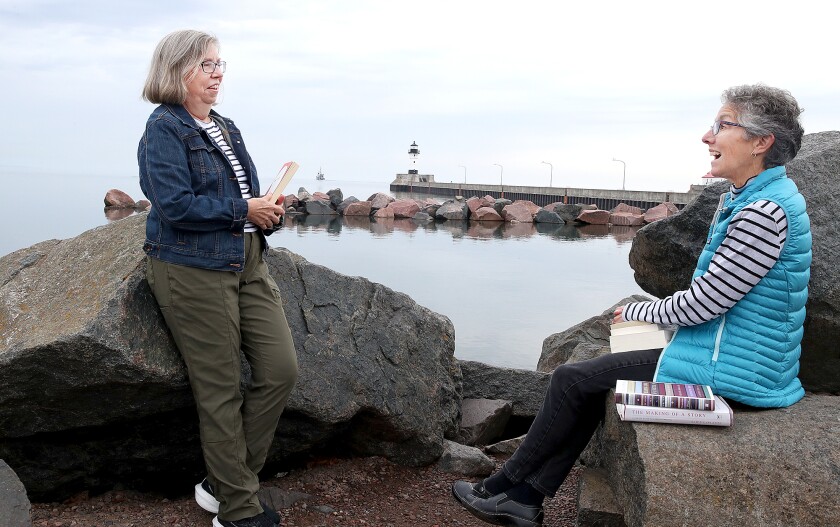
As Hoeg talked about the need for Lake Superior Writers to master the basic logistics of running the awards, Trowbridge chimed in with a concise description of what the organization needs to do this first year: "Prove it to ourselves."
"The awards celebrate books about this area," said Rosendahl. "We're really trying to highlight the books that help us understand and celebrate this region. I think a lot of us feel very lucky to be able to live here."
ADVERTISEMENT
This story was updated at 11:06 a.m. Oct. 12 to add information about this year's NEMBA winners. It was originally published at 9:47 a.m. Oct. 12.



